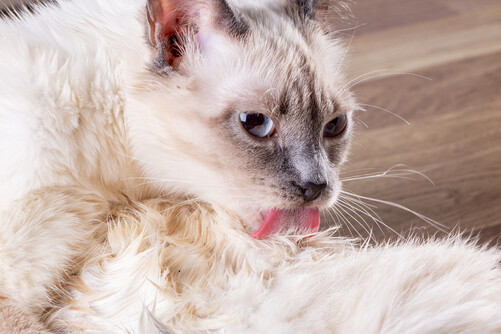If your pet is scratching, licking, or biting more than usual, you’re probably wondering what’s causing all the fuss.
Itching, also called pruritus, is a sensation that makes your dog or cat want to scratch, rub, lick, or chew their skin. While occasional scratching can be normal, persistent or severe itching often signals an underlying issue that needs attention.
What causes itching in pets?
Many conditions can make an animal itch, and often they have multiple problems at once. Here are some common causes:
Allergies: Just like humans, our pets can be allergic to things in their environment (such as pollen or dust mites), certain foods, or parasites.
Fleas and parasites: Fleas, mites, lice, ticks, and flies can all cause intense itching.
Skin infections: Bacterial or yeast infections often develop secondary to other skin problems, making itching worse.
Other skin conditions: Autoimmune diseases, tumours, or skin growths can provoke itching.
Behavioural causes: Sometimes boredom or anxiety causes pets to lick or chew excessively, even without a skin health problem.
Recognising the signs
Itchy dogs or cats may have behaviour or symptoms such as:
Excessive scratching, biting, or licking
Red, inflamed, or irritated skin
Hair loss or bald patches
Unpleasant odours or crusty, thickened skin
Ear scratching or head shaking
Sometimes, pets lick or scratch so much they break the skin, leading to wounds or infections. In cats, over-grooming may even result in bald bellies – often a sign of stress or allergies.
Why is it so hard to pinpoint the cause?
Because many conditions can cause similar symptoms, diagnosing the exact reason for your pet’s itch can be challenging. It often involves a thorough exam, skin tests, samples to check for parasites or infections, and sometimes allergy testing.
Moreover, pets with allergies may react to multiple triggers – like fleas, food, and environmental allergens – at the same time. This complexity means that treating only one cause might not fully relieve their discomfort.
Treatment and management
Treatment depends on identifying and addressing the underlying cause. Common approaches include:
Medications: Antibiotics, antifungals, anti-inflammatories, or allergy-specific treatments.
Parasite control: Regular flea and mite preventatives.
Allergy management: Special diets, allergy testing, and environmental control.
Skin care: Medicated shampoos or topical treatments can soothe irritated skin.
Addressing secondary infections: Bacterial or yeast infections require targeted therapy.
In some cases, severe or chronic cases may require additional interventions, such as allergy immunotherapy or even surgery, like removing inflamed tissue or the entire ear canal.
When to see your veterinarian
If your pet is scratching frequently, develops redness or hair loss, or if the itching worsens, it’s time to come and see us. Early diagnosis helps prevent secondary infections, wounds, or more serious skin problems. Remember, prolonged itching can be uncomfortable and painful for your pet, and timely treatment can significantly improve their quality of life.
Persistent itching in your dog or cat is a sign that something isn’t right. Whether caused by allergies, parasites, infections, or other health issues, early veterinary evaluation and tailored treatment will help your furry friend feel comfortable and happy again. Regular check-ups and prompt action are key to managing pruritus effectively.



